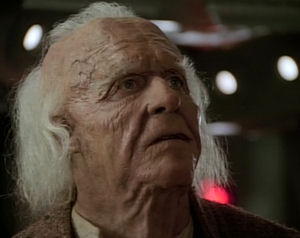| |||||||||||
| |||||||||||
|
Spoiler-free notes: At the start, there's another unique mission type, this one related to the kind of things that can happen when you have children on board. One question, though: why are there such poisonous plants within easy access? One of the problems with having an android on board is that he can be reprogrammed like this. No doubt this should lead to some debate about the wisdom of his presence, even though it would stand to reason that anybody can be subverted in one way or another. Since Data is being manipulated by his creator, using pre-existing programming, I'm not going to count this episode towards my alien subversion list. The main computer should have some defense against someone using the captain's voice like that. At the least, it should be able to recognize that Picard is in Engineering when the commands start coming from the Bridge. I really love the cat-and-mouse sequence with Data, which reminds me of "The Hunted," but wouldn't it be easier for Data to simply flood the ship with anesthizine gas? Maybe he has safeguards against putting people in unnecessary risk, although such safeguards would probably preclude him from interrupting the mission to save young Willie Potts. Or maybe he doesn't want to risk somebody quickly getting into a pressure suit or something like that. There's a lot of interesting subtlety in the dialogue. Dr. Soong expresses disappointment that Data hasn't become a scientist, choosing instead to join Starfleet, and then Data segues the conversation into why Soong created him in the first place. Dr. Soong then goes into a florid explanation about why people choose to do what they do ("Why does a boxer box?"). Data could easily turn Soong's words right back at him to explain why he (Data) chose to become a Starfleet officer. The conversation continues in that vein, and even Soong acknowledges at the end that he is answering more than one question. I also love that Soong talks to Data as though he is a father teaching his son, and it's really touching that, when his creator is dying, Data uses this lesson to comfort him. The idea of Lore interacting with Pakleds is really funny. The Pakleds, you will remember, are the intellectually challenged aliens who attempt to capture La Forge in "Samaritan Snare." It's interesting that even Lore reacts to the news that Dr. Soong is dying. It seems as though Lore isn't a complete sociopath, even though his later patricide proves otherwise. In truth, he is more concerned that he won't have more time to get answers from his creator. When Lore then goes on to wonder why Soong didn't just fix him rather than shut him down and build Data to replace him, the writers give Lore a much more interesting and fully developed character than the cartoonishly evil one we see in "Datalore." After he switches places with Data but before Soong realizes who he is, Lore uses lots of contractions. The writers deliberately let Lore escape, more unpredictable than ever, which is their promise to us that we will be seeing him again. This further reinforces that each main character--Data, in this case--has an arc that spans much more than one episode or plotline. "Brothers" is another excellent and poignant character study that deals with family, much like the previous episode, "Family." Though there is some action in the beginning and the story centers on androids, it's still pretty atypical from what we've come to expect out of TNG thus far. | |||||||||||
|
| |||||||||||
| |||||||||||
|
Copyright ©2011 e. magill. All rights reserved.
|

